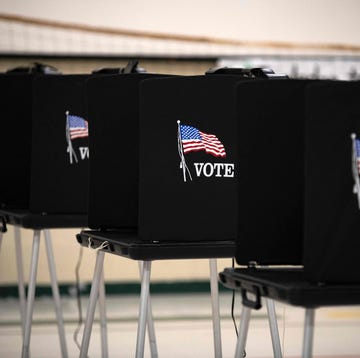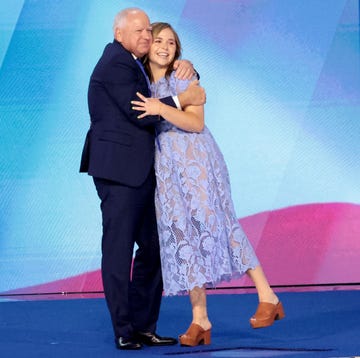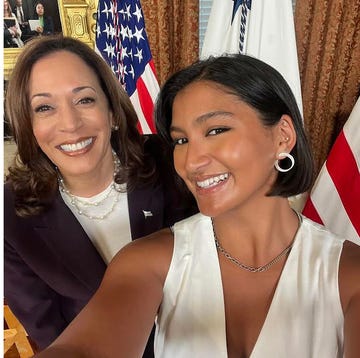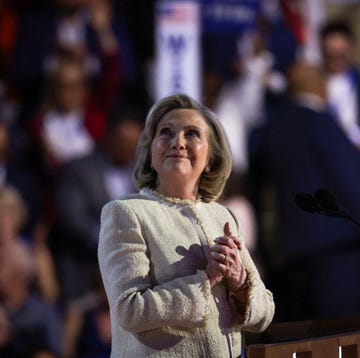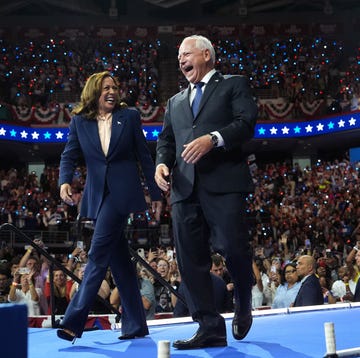For Jasmine Wahi and Rebecca Pauline Jampol, the founders and co-directors of Project for Empty Space, art has always been the answer.
The curators and activists met in college, where they found themselves in the same creative circles, and soon became close collaborators, working on projects that centered on women’s rights, police brutality, and queer liberation. Their latest collaboration, Body Freedom for Every(Body), is their most ambitious undertaking yet. Wahi and Jampol brought together artists including Mickalene Thomas, Yvette Molina, Marilyn Minter, and Barbara Kruger, to create a conversation-starting exhibition inside a 27-square-foot truck. Now, the show is making a cross-country road trip with stops in cities like Austin, Texas; Tempe, Arizona; West Palm Beach, Florida; and Washington, D.C.
Their ultimate goal is to highlight the importance and political urgency of Americans’ current battles for control of their own bodies, as conservative officials restrict access to abortion and gender-affirming care. For both founders, the right to bodily autonomy isn’t just a women’s issue or a New York issue or a liberal issue—it’s a global issue.
When I initially met with both Wahi and Jampol to learn more about how Body Freedom for Every(Body) came to be, the future of our nation looked very different. Then, in the week before our next conversation, President Joe Biden dropped out of the race against former president Donald Trump, Vice President Kamala Harris became the new Democratic nominee, and the word hope re-entered the election conversation.
“I’m feeling more optimistic than I was the last time we spoke,” Wahi says in that second talk. “And I’m really hoping that the changes in candidate and potential leadership push people to get out and vote and make sure we protect what is so important for us. It’s been nice to see that boost of energy from people."
The Body Freedom for Every(Body) truck, of course, was created to jump-start discussions. Alongside a rotating curation of pieces that will feature artists from across the nation, the truck itself is a vessel for highlighting some of the uncomfortable truths we face when it comes to the United States’ views on bodily autonomy, and the relentless wave of threats to reproductive and gender-affirming health care here.
“I really did think one day, following so many of the projects we had previously done … it would be so great if we just had a truck to take this across the country,” says Wahi. “And it just so happened that one of our supporters had a truck, which meant we didn’t have an excuse not to do it.” One Kickstarter and an influx of donations later, the Body Freedom for Every(Body) exhibit was born.
Turning a truck into a mobile, art-filled, physical political statement was also a way to disrupt the accessibility gaps that often exist in the art world.
“We absolutely could have done another series of gallery exhibitions or museum exhibitions,” says Wahi. “But we are also really aware of the some of the barriers to entry with museums and art spaces, so this is a way to have these conversations using art but not just in the context of art. I like to think of this project as a FUBU project in the sense that it’s really for us and by us.”
Jampol adds: “Art is a mode of expression and a mode of expressing one’s identity. We’re taking this truck that shows this beautiful array of perspectives and reflections of folks’ identities, and that is in many ways a more effective and in fact impactful way of having a conversation around these social issues.”
Both Wahi and Jampol looked to their personal creative communities when it came time to curate the exhibition. The truck’s interior curation (which includes paintings, collages, photography, and even wallpaper installations) will change throughout the duration of its tour across the country,
“There’s over 200 artists that are in it, and a lot of them have been making work around this topic for a really long time and have dedicated their practice to having conversations around body autonomy,” says Jampol. “We wanted to honor the artists that have been doing this work in a variety of environments for so long, but then also open up space for, you know, a continued growing list.”
The official tour kicked off last week in New York City, with an event in Times Square that featured speakers and a performance by the Resistance Revival Chorus to bless the vehicle for the journey ahead. The first attendees toured the truck while Beyoncé’s “Break My Soul” and Mariah Carey’s “Fantasy” soundtracked the soft opening.
Celebratory and interactive events will take place across the country during the tour, including “truck talks” with local activists and community leaders, resource fairs, and special performances. But the founders very much see the tour as just the beginning; they'll tell anyone who will listen that this exhibition is meant to endure far past election season. It will have an online home with an accessible digital database, so that those who aren’t physically able to visit a tour stop can still experience the work of the artists involved. An oral history project will also eventually be uploaded to the official website to commemorate the ongoing truck talks and the project as a whole.
“The truck is not going away, but this is a first big step in a larger, more kind of archival component of the project,” says Jampol. “When we bring art into the picture, it offers this vehicle for thinking in a new way or imagining or dreaming or celebrating or feeling seen. Art to us is our love language, and it’s our dialect or vernacular to have a larger conversation around these issues. Art, social change, and social movement should exist in a symbiotic relationship.”
Follow along with the Body Freedom for Every(Body) project, and see when the truck will stop in a city near you.
Bianca Betancourt is the culture editor at HarpersBAZAAR.com, where she covers all things film, TV, music, and more. When she's not writing, she loves impulsively baking a batch of cookies, re-listening to the same early-2000s pop playlist, and stalking Mariah Carey's Twitter feed.







